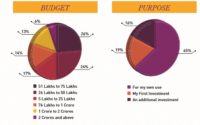Financial Independence Key Driver For UAE Women To Join The Workforce In 2021
A new survey conducted by Bayt.com – the Middle East’s #1 job site – and YouGov – global online market research company – entitled Working Women in the MENA, revealed that financial independence (55%) is a key reason women enter the workforce in the Middle East.
Economic and social factors have continued to alter the landscape for working women and their economic contributions are becoming increasingly important within households – 51% of female respondents said that they seek employment to support or financially contribute to the household, 43% do it to broaden perspectives on life and42% said to secure the family/children’s future.
Ola Haddad, Director of Human Resources at Bayt.com said: “Our survey explores the status of working women across the MENA region by analyzing their perceptions about equality at work and their motivations for employment. It identifies the employment challenges today’s working women face, and examines how these concerns relate to their job and career decisions.”
The survey results show that a large majority of UAE respondents (83%) have a mix of men and women at their workplace. Almost three-quarters (73%) of women say they are comfortable working in a mixed-gender environment, with 51% claiming to be extremely comfortable. A relatively small number of respondents (4%) are uncomfortable with mixed-gender environments in the UAE.
Gender Equality at UAEWorkplaces
Companies in the MENA region recognize that gender equality is a crucial component to creating inclusive workplaces.Overall, a majority of women believe that women and men are treated equally at their workplace across a variety of areas, including career progression (67%), recruitment and selection (63%), and benefits offered (55%).
In line with the overall feeling of workplace equality, the majority of the respondents in the UAE(59%) reported working the same number of hours as male colleagues, while 31% reported working more hours than male colleagues.
Benefits Offered to Women
As for women-specific benefits in the workplace, the top five benefits MENA respondents receive from their organizations are personal health insurance (39%), paid maternity leave (38%), job-related training (31%), transport allowance (30%), and family health insurance (24%).Most women reported their organization offers official maternity leave of one to three months.
The Pursuit of Happiness
An analysis of survey data highlights some very concrete truths about the progress of female empowerment within the MENA region. Establishing a successful career emerged as the main source of happiness for most of female respondents (49%), followed by maintaining good health (49%), making money (33%) and spending time with family (32%).
To understand what women value in their decision to take a job, the survey asked respondents to reflect on which job characteristics are important to them. Overall, the majority (57%) of respondents selected a higher salary as the most important benefit, followed by opportunities for long term career growth (37%) and health insurance for whole family (28%). Less travel and separate work areas appear to be significantly less important.
Women respondents indicated that their career choices had a positive effect (34%) or no effect (38%) on their marital life. Furthermore, 47% of those surveyed believe their future marriage plans would affect their career choices at least to some extent whilst 31% believe these plans will not affect their career choices.
Zafar Shah, Research Director at YouGov said: “Our survey analyzed female job satisfaction in the region and found important links between women’s job satisfaction and an employer’s culture and benefits. While most of our respondents believe women and men are treated equally at their work environment, the research will help employers focus on what matters to women in the workplace.”
Data for the Bayt.com and YouGov’s Working Women in the MENA survey was collected online from December 2, 2020 to January 7, 2021. Results are based on a sample of 1,243 female respondents from the following countries: UAE, KSA, Kuwait, Oman, Qatar, Bahrain, Lebanon, Jordan, Iraq, Palestine, Syria, Egypt, Morocco, Algeria, Tunisia, Libya and Sudan among others.







